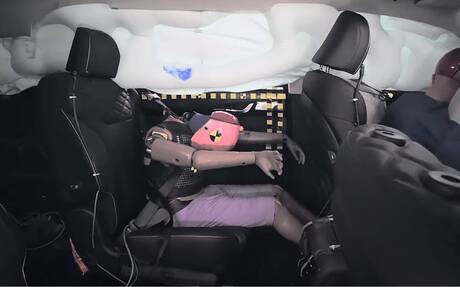Most Midsize SUVs Fail to Adequately Protect Rear Passengers in a Crash
While larger vehicles tend to fare better in collisions with smaller vehicles, they still have a lot of room for improvement when it comes to protecting their occupants.
As we reported last year, a third of midsize SUVs failed the U.S. Insurance Institute for Highway Safety’s new side crash test, which aims to address higher-speed collisions that continue to cause fatalities on North American roads.
- Also: These Are the Safest Vehicles in 2023, IIHS Says
- Also: Compact Cars Get Mixed Reviews in New IIHS Side-Impact Test
The IIHS recently updated its longstanding moderate overlap front crash test to add a rear passenger dummy positioned behind the driver. As it found out, most midsize SUVs offer inadequate front crash protection for passengers seated in the rear, which are most often kids.
Among the 13 midsize SUVs tested, only the Ford Explorer, Ford Mustang Mach-E, Subaru Ascent and Tesla Model Y earned good ratings.
Three others got marginal ratings including the Chevrolet Traverse, Toyota Highlander and Volkswagen Atlas. Unfortunately, the Honda Pilot, Hyundai Palisade, Jeep Grand Cherokee, Jeep Wrangler Unlimited (four doors), Mazda CX-9 and Nissan Murano were all rated poor.
The IIHS notes that automakers have significantly improved their front-seat restraint systems while those in the rear have barely evolved over the past 15 years. In fact, in vehicles from model year 2007 onward, the risk of a fatal injury is 46 percent higher for belted occupants in the rear seat than in the front.
The new test incorporates a dummy representing a small woman or 12-year-old child positioned in the second row behind the driver and uses specific metrics that focus on the injuries most frequently seen in rear-seat occupants.
In the poor-rated vehicles, measurements taken from the rear dummy indicated a high or significant risk of head or neck injuries to the rear passenger. The Wrangler, in particular, lacks a side curtain airbag in the rear and the lap belt moved from the ideal position on the pelvis onto the abdomen during the test. Several models also had problems with rear seat belt tension.
Rear passenger protection is not yet among the criteria for the IIHS’ Top Safety Pick+ and Top Safety Pick awards, but it will appear next year. The organization is regularly adding new requirements for these awards, which is why fewer models earned one for 2023.
